Legislature’s dirty little secret revealed
Backdoor spending is the norm
- Wednesday, April 22, 2009
For decades here in Nevada, the caterwauling from tax-consumers and their political allies has been loud and constant: Silver State budgets, they wail, are much too tightfisted, “selfish” and “unprogressive.”
What they haven’t been telling you, however, is about all of the spending state lawmakers have been perpetrating through the back door — after the biennial budgets are approved — in a practice that’s been going on for at least 30 years.
Newly released figures from the state budget office reveal that Nevada significantly overspends its biennium budget 75 percent of the time. Consider this chart, based on data provided by the office of state Budget Director Andrew Clinger, in response to an open-records law request:
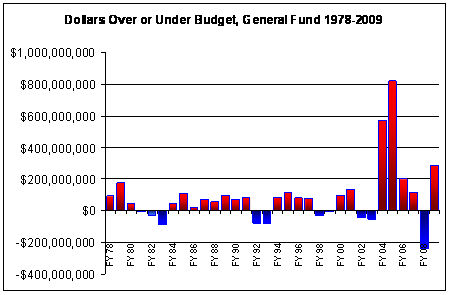
Source data: State of Nevada
In other words, since 1978, Nevada has spent more than its budget 22 out of 32 years — for a total unbudgeted overage of $2.83 billion. In any given year, Nevada has been over-budget by an average of $88 million, and for any given biennium, by $177 million. Since 1978, 12 of 16 biennia have seen above-budget spending.
So where’s the money going out the door? Primarily responsible are two operations of the state legislature, NPRI was told. One source is the legislature’s Interim Finance Committee, which — between sessions — often allocates “supplemental” monies to state government agencies. Because this decades-long practice gives decisive power to only certain lawmakers and thus deprives many non-represented Nevadans of their 14th Amendment rights to equal representation under the law, a quiet consensus appears to be developing in many legal and political quarters of the state that the practice is unconstitutional.
Nevertheless, the largest source of the over-budget backdoor spending has not been Interim Finance but simply the largely unpublicized supplementary spending binges of state lawmakers. Toward the end of the final fiscal year of each biennium, legislators are informed of the level of revenues in state coffers. In the economically flush times — about two-thirds of the time — the state treasury has contained additional revenues, allowing lawmakers to increase their spending over levels agreed upon previously.
Thus, when times are good, Nevada’s government spends excessively. Indeed, in the run-up to this current budget “crisis,” Nevada lawmakers not only blew massive budgetary surpluses on new programs, but drastically overspent even after that. The available data suggests legislators blew an excess of $1.4 billion in the 2003-05 biennium — roughly the size of our budget shortfall for 2007-09. Between the two years of 2004 and 2005, Nevada’s government spending grew faster than it did in the entire previous decade.
Naturally a legislature so allergic to any kind of spending cap regularly gets itself in trouble when the economy sours. Then the special-interest cries of “crisis” begin, and lawmakers start casting about for taxes they can raise or introduce.
Although they recently passed a tax increase on hotel rooms, it not surprisingly only whetted their appetite for more of your hard-earned income. Today Nevada state government believes it needs a whopping 17 percent increase just to “maintain” spending levels that, in actuality, will set new records.
Lawmakers are clearly out of touch. As resort entrepreneur Steve Wynn recently observed, “Anybody who raises taxes now is purely psychotic. Every time they touch a tax now, you can increase the unemployment line at the Culinary union and every place else in this city.”
Unfortunately, policymakers in Carson City hear less from honest taxpayers and more from the entrenched interests that always hunger for more porky government spending.
Nevada’s budget problem does not result from insufficient revenue. If Nevada’s government had shown restraint and a little responsibility — spending limits and a rainy day fund — Nevada would not be in the situation we are in today.
The Silver State does not need billions in new taxes. It needs responsible, accountable and mature governance.
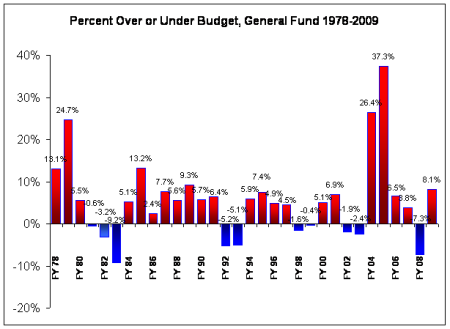
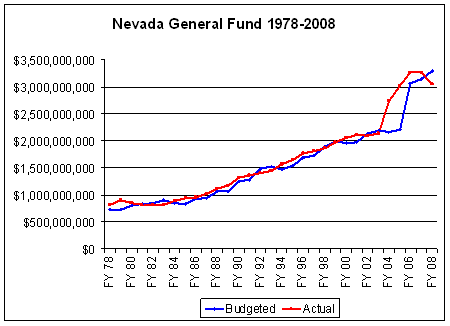
* Gibbons administration data suggests that Nevada will spend $3.8 billion in FY 2009 despite budgeting $3.5 billion and only collecting $2.77 billion in taxes.
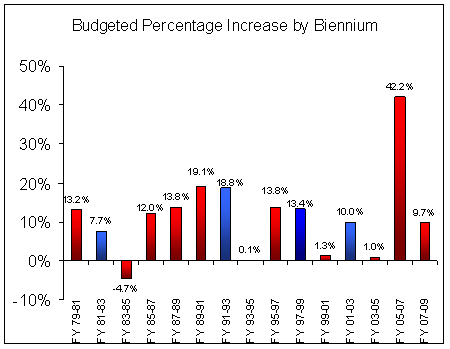
*Blue bars represent budgets in which Nevada spent less than what was appropriated.
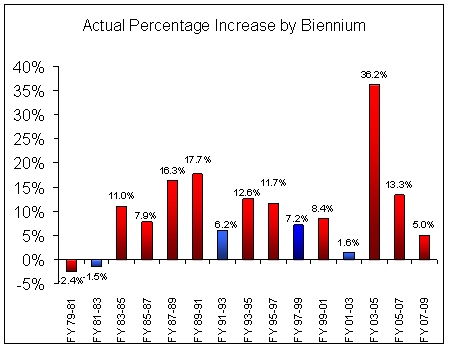
*Blue bars represent budgets in which Nevada spent less than what was appropriated. This graphic
takes into account cumulative overspending or under-spending from the previous year.
(All graphs in this commentary are adjusted for inflation to 2008 dollar values. If FY 2009 is included, it is reported in nominal dollar values, as estimated in the winter of 2008-09 by the Gibbons administration.)
Patrick R. Gibbons is an education policy analyst and Steven Miller is the vice president for policy at the Nevada Policy Research Institute.





